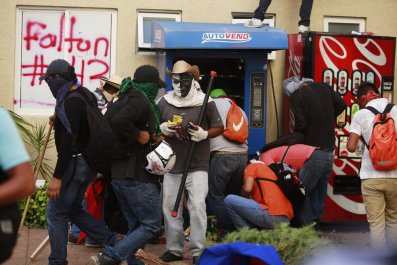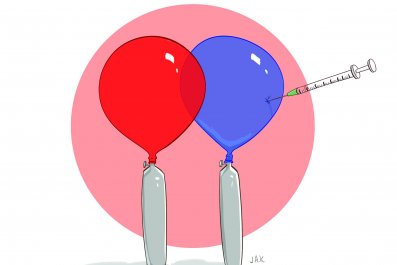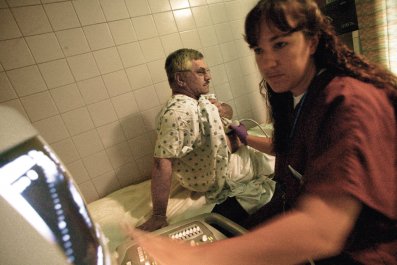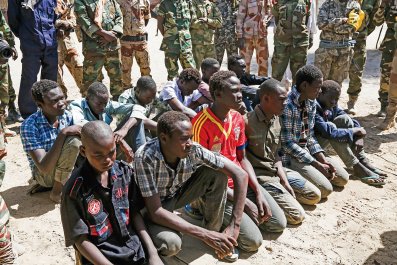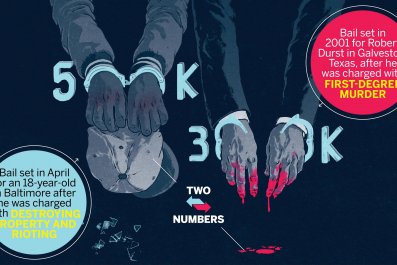"I was walking to the elevator when he came up behind me. 'This'll teach you to never look at a real man again. Now you're going to die, faggot!' he screamed, before stabbing me in the neck."
I'm talking to Rodrigo Mariano Miguel, a young man living in a small town on the outskirts of São Paulo, Brazil. He's tall and thin, and despite the neck brace he's wearing, he talks animatedly about what happened that day. The attack came in his apartment building, and he shows me the security video that captured everything. In it, you can see Miguel walking calmly into the complex. Moments later, his attacker rushes up behind him, brandishing a kitchen knife. The man stabs Miguel twice in the neck before running away.
"When I got to the hospital," says Miguel, "the doctors told me I was extremely lucky. I came inches away from being a quadriplegic for the rest of my life."
Miguel's next-door neighbor, Wanderson Pacheco de Oliveira, 39, has been charged with grievous bodily harm. Miguel says the assault was the culmination of months of verbal abuse that started when Oliveira found out he was gay. "When I'd stand with him in the elevator, he'd whisper 'bitch' or 'faggot' under his breath," Miguel says. "But I never imagined it would escalate like that."
According to Brazilian newspaper Folha de São Paulo, Oliveira says he didn't know Miguel was gay and offers another reason for the attack: "I was talking with my mom on the phone, and he started banging on the wall, asking me to lower my voice."
Miguel's experience is not uncommon. Brazil has a global reputation for its huge gay pride parades, but it also has one of the highest levels of violence toward lesbian, gay, bisexual and trans people in the world. According to the Gay Group of Bahia, there were 326 murders of LGBT people in Brazil last year. That's a rate of nearly one death every 28 hours. Trans women make up a disproportionately large percentage of the victims.
I spoke with Renata Peron, a leading trans advocate in São Paulo who has experienced the violence firsthand. "I was walking downtown one night when I was accosted by nine men," she says. "One of them had steel-capped boots. He kicked me so hard I lost a kidney."
According to Majú Giorgi, a prominent LGBT activist and founder of Mothers for Diversity, the average life expectancy for a trans woman in Brazil is just 36 years. She chain-smoked as she described the situation in Brazil. For her, the problem originates in a society with strictly defined gender roles. "Brazil is in a lot of ways a very traditional, very religious society. Machismo is very strong here. We're leading the world in homophobia." She says many of the families of trans women reject them and throw them out of their home at a young age. Marginalized from society, they often end up living on the street and working in the sex industry.
One Sunday afternoon, I walked through São Paulo's decaying downtown. As night fell, the streets were dotted with young trans women standing on corners in miniskirts, looking for their next trick.
Working hard to improve things is Jean Wyllys, Brazil's first openly gay congressman. For him, homophobia in Brazil goes back to the "very foundation of the country." Steeped in Catholic doctrine, Brazilian society is based on traditional gender roles and, says Wyllys, "an aversion to sexual diversity."
The rise of powerful evangelical churches has reinforced such attitudes. Marshaling congregations of many millions and raising an equally impressive amount of money, churches such as the Universal Church of the Kingdom of God have become influential in politics and society.
I spoke to Bruno Bimbi, a political activist from Argentina who was instrumental in passing that country's marriage equality legislation. Now living in Brazil, he is one of Wyllys's closest advisers. "Evangelical churches have completely infiltrated the political system in Brazil," he says, pointing to the current makeup of Congress as proof.
After the country's last election, a number of religious conservatives were elected to office. Currently, 80 of them are affiliated with evangelical churches. Eduardo Cunha, president of the Chamber of Deputies, is openly homophobic. Following the first gay kiss on Brazilian TV, Cunha took to Twitter to express his "revulsion." One of his first proposed bills was the creation of "hetero pride day" to combat what he calls "heterophobia."
Cunha and his right-wing allies are known by activists in Brazil as the "House of Cunha" for their stranglehold on the country's politics. Cunha recently proposed a piece of legislation called the Estatuto da Família (Statute of Families), which would limit the definition of family in Brazil to a unit based on one man and one woman—effectively annulling the 2013 judicial ruling in favor of same-sex marriage and excluding millions of Brazilian families from state protection.
While this legislation is unlikely to pass Brazil's judiciary process, Bimbi says it constitutes a powerful symbolic threat. The result of this political homophobia, says Wyllys, is "social homophobia—an atmosphere where physical homophobia becomes acceptable."
Compounding the situation is a police force that lets such violence happen with impunity, even on occasion within its own ranks. In April, a photo of trans woman Verônica Bolina went viral in Brazil. It shows Bolina sitting on the ground, surrounded by military police. Her breasts are exposed, her face beaten to a swollen pulp—she is unrecognizable. Police initially said cellmates attacked her in jail, but she later told São Paulo authorities investigating the incident that the police committed the assault.
Bolina was arrested April 10 and charged with attempted murder of an elderly neighbor. Regardless of the serious charge against her, the possibility that police officers beat her during or after the arrest provoked an outcry from the LGBT community against transphobic violence. They took to social networks and popularized the hashtag #SomosTodasVerônica (#WeAreAllVerônica).
"Verônica's case is emblematic of police violence against trans women," says Peron, the trans activist. "But the truth is, the police are violent toward all minorities. They're underpaid, and they're not professionally trained to deal with minorities. So of course trans people suffer the brunt. Because to them we're not even people."
Yet for all the violence, Brazil has on many levels become increasingly accepting of the LGBT community. São Paulo's pride parade is the largest in the world, attracting over 3 million people. Local gay club The Week is the biggest in Latin America; its recent Babylon party drew 5,000 clubbers. On Saturday afternoons, you can head to Praça Benedito Calixto and sip on a caipirinha while muscle boys in tank tops flirt and women make out on motorcycles. "Brazil is a country of contrasts," explains Luís Arruda, a prominent civil rights lawyer and activist. "Right now, the LGBT community is in a phase of growing self-esteem. But there are many worlds in Brazil."
I spoke to Arruda in his living room. On the green wall behind him was a wooden head of a deer, painted purple and yellow. In Portuguese, the word for deer, viado, colloquially translates to "faggot." But the queer community has gradually appropriated it: For Arruda and his friends, the deer is a trophy they have claimed.
Arruda describes how when he was a teenager, being gay was seen as something "really awful." But, he says, times have changed. A vibrant queer culture has emerged in São Paulo. Gay characters now appear regularly on mainstream media. Just a few weeks ago, Brazil's leading lady Fernanda Montenegro (an Emmy winner and Oscar nominee) was seen in a passionate kiss with co-star Nathalia Timberg on the popular telenovela Babilônia.
"I started working on this issue 10 years ago," says Giorgi from Mothers for Diversity. "When my son came out...I suddenly realized he had almost no rights in this country. Now he could marry his boyfriend if he wanted."
Even so, LGBT people in Brazil know there is a long way to go. Miguel, the young man who was attacked in his apartment building, says police declined to bring the more serious charge of attempted homicide against his assailant. The police, says Miguel, "didn't want to hear my side of the story at all."
Correction: This story originally said that Renata Peron was beaten so hard she lost an eye. She lost her kidney, not her eye.





